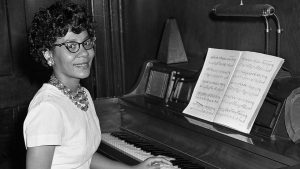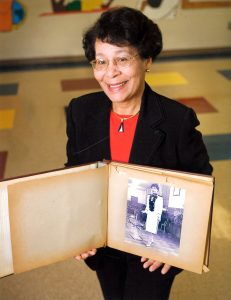
Mary Frances Early at the piano just before enrolling into UGA’s graduate program. At left on the piano is a plaque awarded to Miss Early as Teacher of the Year for 1959-60. (AP Photo/Harry Cabluck)

Mary Frances Early holds up a photo of herself at John Hope Elementary School where she was teaching when she decided to transfer to UGA. (Photo by Nancy Evelyn/UGA)
Our third historical figure is Mary Frances Early, the first African American graduate of the University of Georgia. Early was born on June 14, 1936, in Atlanta. Her love for learning blossomed as a child, as she spent much of her time in the library across the street from her father’s restaurant. Her mother was a public-school teacher in Monroe, and her father, an amateur singer. This upbringing, coupled with her charismatic band teacher at Turner High School in Atlanta, influenced her to major in music education at Clark College (now Clark Atlanta University).
In January of 1961, Charlayne Hunter and Hamilton Holmes enrolled in UGA as the first African Americans to attend. “I sent in my application just after Char and Hamilton were evicted from campus for their own safety after a riot,” Early later recalled. “And I thought, ‘Well, they have been brave enough to open up the undergraduate school, so somebody needs to step forward to open up the graduate school—why not me?’” Early described the admissions process as “not pleasant.” Her interview was met with inappropriate questions, she was told she would lose all of her graduate credit hours from the University of Michigan, and officials even went as far as investigating her voting records and family medical records. Eventually, Early received an acceptance letter from UGA in early May of 1961, and within a few days she arrived in Athens for summer classes.
Early’s time on campus was filled with near constant abuse. She recalled students throwing lemons at her in the dining hall, attempting to bar her from the library by joining hands in front of the doors, and at one point, her automobile was vandalized with racial slurs. Early had the car repainted, and she continued her studies. Despite the treatment from students, the school held a dear place in her heart. “I came to love Georgia as a school,” she later recounted. “I didn’t like a lot of things that went on sometimes, but the music department was a place of refuge.”
Early graduated with a master’s degree in music education in 1962. “The thing that I like to hear most is that, thank you for helping to pave the way, because that was my intent” according to Early. “I knew that if I got a degree that others would follow.” She recounted, “…When I leave here, I want to be known as one who helped with the desegregation.” She went on to work for three decades in the Atlanta public school system as a teacher and system music director. In her retirement, she chaired the music department at Clark Atlanta University, and taught as an adjunct professor at Spelman and Morehouse Colleges.
In 2000, Early was welcomed to UGA by graduate and professional scholars. In the years following, the university came to embrace her legacy. In 2013, she was awarded an Honorary Doctor of Law degree by UGA, and in 2018 President Jere Morehead presented Early with a presidential medal. In 2020, the school’s College of Education was renamed in her honor.
References
Famous educator Mary Frances Early comes to Georgia Writers Museum. Recorder. (2022, March 1). Retrieved February 6, 2023, from https://www.unionrecorder.com/news/famous-educator-mary-frances-early-comes-to-georgia-writers-museum/article_9a326182-999f-11ec-84e4-2f10997e2c75.html
Griffin, J. (n.d.). Mary Frances early – new Georgia encyclopedia. Retrieved February 6, 2023, from https://www.georgiaencyclopedia.org/articles/history-archaeology/mary-frances-early-b-1936/
Ridley By, A. (2021, September 23). Mary Frances Early discusses autobiography, Civil Rights Legacy. WUGA. Retrieved February 6, 2023, from https://www.wuga.org/local-news/2021-09-22/mary-frances-early-discusses-autobiography-civil-rights-legacy